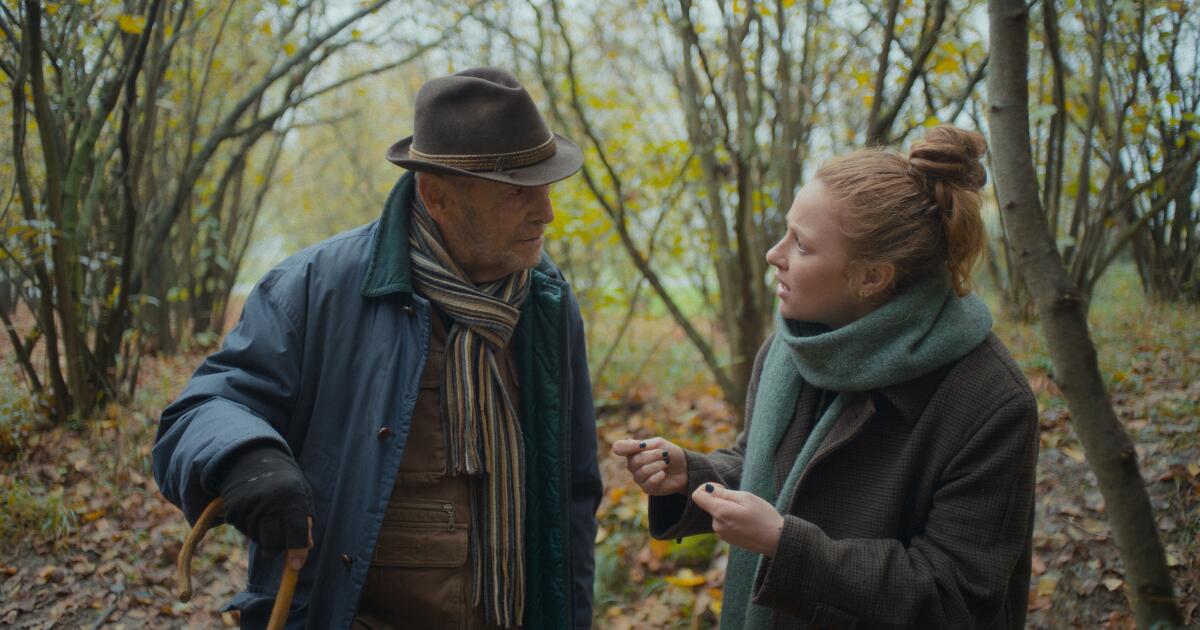To watch “Trifole” is to fall in love with Langhe, a gorgeous section of the Piedmont region of northern Italy. Famed for its farming, cheeses and wine, this hilly, rural countryside feels cut off from modernity: an agrarian past perfectly preserved in an uncertain present. Among Langhe’s hallmarks is its rich tradition of truffle foraging, which becomes the centerpiece for director Gabriele Fabbro’s gentle drama about an aging truffle hunter, his restless granddaughter and a way of life vanishing before their eyes. Unfortunately, this heartfelt film resonates most strongly through those majestic landscapes, not via the story that unfolds.
Constructed with the elemental purity of a fable, “Trifole” introduces the viewer to Dalia (Ydalie Turk), who’s in her late 20s and visiting her grandfather Igor (Umberto Orsini). The trip is a reluctant one for Dalia. Prompted by her anxious mother Marta (Margherita Buy), she’s taking a break from her stalled life in London to check in on him due to Marta’s concern that his failing memory may require him to abandon his beloved crumbling cottage and enter a nursing home. When Igor initially mistakes Dalia for his daughter — Dalia’s mother — his confusion validates Marta’s worries.
Happy to live out the rest of his days in his remote paradise alongside his loyal dog Birba, who ably assists him in his truffle hunts, Igor is displeased that Dalia has rejected her family roots for the big city. Indeed, Dalia has trouble with her Italian, and when she offers to help him find truffles, he insists his granddaughter doesn’t have the instincts or the calloused hands necessary for the job. But Igor isn’t just adept at sniffing out truffles — he quickly deduces that she’s emotionally lost. (A writing career hasn’t materialized as she’d hoped.) Both of them are at a crossroads, neither sure what the future holds.
Turk and Fabbro, who co-wrote the screenplay, did extensive research on the region, incorporating locals’ stories into the narrative. No matter how fantastical “Trifole” eventually becomes, the filmmakers insist the plot points derive from tales they collected. (To that end, there actually is an Igor, Birba is a real truffle-hunting dog and there’s a 2020 documentary, “The Truffle Hunters,” that correlates with much of what we see.) Not surprisingly, this melancholy picture celebrates and mourns Langhe, a region imperiled by global warming and encroaching industrialization that threaten the once-fecund practice of truffle gathering. Igor’s fading memory proves to be an apt, albeit obvious metaphor for a vocation slowly losing its connection to its past as truffles have emerged as a hot gastronomic trend.
In its early stretches, “Trifole” is almost rudimentary in its storytelling, establishing a familiar generational conflict between Dalia and Igor, who live under the same roof but can’t see eye to eye. When she tries to compliment his picturesque farmland, he curtly responds, “It’s nothing like the soil I knew when I was young.” The tension only escalates once Dalia discovers he’s terribly behind on his mortgage, owing hundreds of thousands he doesn’t have. Igor’s only hope is to find an elusive (and valuable) white truffle that could save him from foreclosure. But he is now too frail to brave the deep woods. Dalia, guided by Birba, must take up the quest.
The film’s themes are simply drawn and easy to follow. Dalia may reside in cosmopolitan London but is, of course, miserable, with wise old Igor immediately diagnosing the cause of her malaise. “You don’t love anything,” he advises sagely. “This will end up hurting you a lot.” Consequently, Dalia’s journey to find the mythical white truffle will also be an opportunity to locate a sense of purpose, coming to appreciate her grandfather in a more profound way. Turk conceives her character as a collection of insecurities and hesitant expressions, making Dalia the perfect candidate to be metaphorically reborn through an unlikely forest adventure in which magical events will occur.
In his sophomore feature, Fabbro, who previously directed the 2021 romantic thriller “The Grand Bolero,” juxtaposes the quiet grace of Igor’s modest life with the cacophony and commercialism of contemporary truffle auctions. But Fabbro’s wistful salute to bygone traditions has significant limitations, especially noticeable in the reductive design of his diametrically opposed main characters. Now in his early 90s, Orsini (best known for Luchino Visconti’s 1969 drama “The Damned”) projects a fragile but resilient gravitas that’s quite affecting, but Igor is reduced to a noble symbol — a simplification that also undercuts Dalia, who is little more than a stand-in for a younger generation ignorant of its country’s history.
Only when Fabbro trains his camera on the Langhe skies, the land stretching off into the distance, does “Trifole” suggest the weight and majesty of a culture in danger of disappearing. You can almost touch the sacred soil of Igor’s youth, a world that he alone remembers.
‘Trifole’
In Italian and English, with subtitles
Not rated
Running time: 1 hour, 40 minutes
Playing: In limited release Friday, Nov. 14
